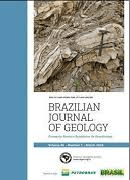
Brazilian Journal of Geology
Scope & Guideline
Unveiling Brazil's Geological Heritage and Insights
Introduction
Aims and Scopes
- Geochemistry and Mineralogy:
Research focusing on the chemical composition and mineral properties of geological materials, including studies on mineral deposits, igneous and metamorphic rocks, and sedimentary sequences. - Paleontology and Stratigraphy:
Investigations into fossil records and stratigraphic relationships, providing insights into historical geological events and the evolution of life in different geological periods. - Structural Geology and Tectonics:
Studies that analyze the structural features of the Earth's crust, including fault systems, tectonic movements, and the implications for regional geology and resource exploration. - Sedimentology and Paleoenvironmental Studies:
Research aimed at understanding sedimentary processes and depositional environments, often integrating ichnology and paleoclimate reconstructions to interpret ancient ecosystems. - Geological Mapping and Remote Sensing:
Utilization of modern techniques such as satellite imagery and geophysical methods to map geological features, assess natural resources, and study environmental changes.
Trending and Emerging
- Integrated Geochemical Analysis:
There is a growing trend towards utilizing advanced geochemical techniques to understand the genesis and evolution of geological formations, which includes the application of isotopic studies and trace element analysis. - Remote Sensing and Geospatial Analysis:
The integration of remote sensing technologies and GIS in geological studies is increasingly prominent, enabling researchers to analyze large datasets for geological mapping and environmental monitoring. - Environmental Geology and Sustainability:
Research focused on the environmental implications of geological processes, including the impact of mining and land use changes, is on the rise, reflecting growing public and scientific interest in sustainability. - Hydrogeology and Aquifer Studies:
Emerging studies focus on groundwater resources, aquifer systems, and their management, highlighting the importance of water resources in geological research, particularly in arid and semi-arid regions. - Geological and Structural Evolution of Regions:
An increasing number of papers are addressing the geological history and structural evolution of specific Brazilian regions, contributing to a better understanding of local geological frameworks and resource potential.
Declining or Waning
- Paleoclimatology:
Research specifically focused on reconstructing past climate conditions through geological records appears to be less prominent, possibly due to a shift towards more immediate environmental concerns and applied geology. - Geological Hazards and Risk Assessment:
Although still relevant, the frequency of studies specifically addressing geological hazards, such as landslides and earthquakes, has declined, potentially reflecting a broader focus on resource exploration and sustainability. - Economic Geology:
While there are still publications on mineral resources and economic geology, the overall emphasis on this area has waned, possibly as researchers shift towards sustainable practices and environmental impacts of resource extraction.
Similar Journals
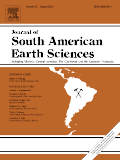
JOURNAL OF SOUTH AMERICAN EARTH SCIENCES
Fostering Insights into Earth's Dynamic ProcessesJOURNAL OF SOUTH AMERICAN EARTH SCIENCES is a premier interdisciplinary journal dedicated to publishing high-quality research in the fields of Earth-Surface Processes, Geology, and Paleontology, making it an essential resource for scientists and researchers focused on South American geology and its diverse geological phenomena. Published by Pergamon-Elsevier Science Ltd in the United Kingdom, this journal has been instrumental in disseminating groundbreaking studies since 1988, showcasing contributions that push the boundaries of knowledge in Earth and Planetary Sciences. With an impressive Scopus ranking—positioning it in the 74th percentile for Paleontology and 71st for Geology—this journal not only reflects robust academic quality but also its commitment to addressing critical geological challenges in South America. Researchers will appreciate its objective of advancing understanding of geological processes while providing insights into past, present, and future Earth environments. Although available through traditional subscription models, the journal's vast repository of articles enriches the academic landscape, facilitating the sharing of vital research among professionals, students, and geological practitioners.

BULLETIN OF THE GEOLOGICAL SOCIETY OF DENMARK
Unveiling the Layers of Earth's SecretsBULLETIN OF THE GEOLOGICAL SOCIETY OF DENMARK, published by the Geological Society of Denmark, serves as a key platform for the dissemination of original research and comprehensive reviews related to geological studies in Denmark and beyond. With an ISSN of 2245-7070, this journal provides a significant avenue for sharing findings that contribute to our understanding of geological processes, resources, and the history of the Earth. Although it operates under traditional access options, the journal encourages a rich scholarly dialogue among researchers, professionals, and students alike. Its impact is evident in the broad scope it covers, catering to diverse areas of geology, including but not limited to sedimentology, paleontology, and environmental geology. By fostering an environment of knowledge sharing, the BULLETIN OF THE GEOLOGICAL SOCIETY OF DENMARK is not just a journal; it is a vital resource for anyone invested in advancing geological science.

China Geology
Exploring the Depths of Earth SciencesChina Geology, published by KEAI PUBLISHING LTD, is a leading open-access journal that serves as a pivotal platform for disseminating high-quality research across a wide spectrum of Earth sciences. Since its inception in 2018, the journal has rapidly established itself with an impressive Q1 ranking in multiple critical categories, including Geology, Economic Geology, and Oceanography, among others, reflecting its significant contribution to the academic community. Positioned as a top-tier journal in the Earth Planetary Sciences domain, it ranks #22 out of 321 in Geology and exhibits an admirable impact in sub-fields such as Earth-Surface Processes and Geochemistry and Petrology. China Geology is committed to promoting rigorous scientific inquiry and facilitating the open exchange of knowledge in the geosciences, making it an essential resource for researchers, professionals, and students eager to explore innovative developments and fundamental advances in geology. The journal’s accessibility ensures that critical findings reach a broad audience, thereby enhancing collaboration and driving forward scientific discourse in the global community.
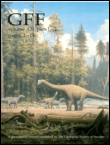
GFF
Advancing Earth Sciences Through Rigorous Research.GFF is a prestigious academic journal dedicated to advancing research in the fields of Geology and Paleontology. Published by Taylor & Francis Ltd in the United Kingdom, GFF serves as a vital platform for disseminating innovative findings and fostering discussions among researchers, professionals, and students alike. With a noteworthy impact factor reflecting its significance in the scientific community, GFF has achieved Q2 ranking in both Geology and Paleontology, underscoring its commitment to high-quality scholarship. The journal has been operational since 1872, accumulating a rich history of contributing to our understanding of earth sciences. It currently ranks #133 out of 321 in Earth and Planetary Sciences - Geology, and #50 out of 113 in Paleontology according to Scopus rankings. Although it does not offer an open access option, GFF remains accessible through various academic databases, ensuring that cutting-edge research reaches a wide audience. Its comprehensive scope aims to explore critical advancements in geological and paleontological sciences, making it an essential resource for those committed to exploring the intricacies of our planet’s past and present.

Andean Geology
Advancing Earth Sciences Across the AndesAndean Geology is a prominent open-access journal, published by the SERVICIO NACIONAL GEOLOGIA MINERVA in Chile, dedicated to advancing the fields of geology, geochemistry, petrology, paleontology, and stratigraphy. Since its inception in 2009, the journal has provided a vital platform for the dissemination of research pertaining to the Andean region and beyond, featuring high-quality articles that contribute to our understanding of earth sciences. With an impressive ranking in the Q2 and Q3 quartiles across multiple categories, it reflects a growing impact in the geological community, evidenced by its status within Scopus rankings. Andean Geology not only supports the academic pursuit of knowledge with its open-access policy but also aims to foster collaboration among researchers and professionals worldwide, ensuring wide accessibility of groundbreaking research and promoting academic engagement. By covering a diverse array of topics relevant to the dynamic field of geology, this journal serves as an essential resource for students, professionals, and scholars dedicated to earth and planetary sciences.

Swiss Journal of Geosciences
Unlocking the Secrets of Our Planet, One Article at a TimeSwiss Journal of Geosciences is a prestigious academic journal dedicated to advancing the field of geosciences, published by SPRINGER INTERNATIONAL PUBLISHING AG. Since its inception in 2007, the journal has established itself as a leading platform for disseminating high-quality research findings in various domains related to Earth and planetary sciences, achieving a notable Q1 ranking in Geology as of 2023. With a solid reputation reflected in its Scopus ranking of Rank #72/321, the journal stands in the 77th percentile within its category. Based in Switzerland, the Swiss Journal of Geosciences embraces an open access model, making it easier for researchers, professionals, and students worldwide to access vital geological research without barriers. The journal’s objectives include promoting interdisciplinary research and fostering insights that address both fundamental and applied geoscientific problems, ensuring it remains a crucial resource for those seeking to understand our planet’s dynamics. Engage with pioneering research and contribute to the vibrant community of geoscientists by exploring the impactful articles published within its pages.
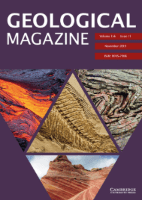
GEOLOGICAL MAGAZINE
Charting the Future of Geological InquiryGEOLOGICAL MAGAZINE, published by Cambridge University Press, is a premier journal in the field of geology, renowned for its rich legacy since 1864 and ongoing contributions to Earth and Planetary Sciences. With an impressive Q1 ranking in Geology and a Scopus rank of #70 out of 321 journals, it holds a significant position within the academic community, appealing to researchers, professionals, and students alike. The journal covers a wide array of topics, ensuring a comprehensive platform for the dissemination of cutting-edge geological research. Although it does not offer open access, it remains a vital resource for those seeking to stay abreast of advancements in the field. With an enduring commitment to quality, GEOLOGICAL MAGAZINE stands as an essential outlet for scholarly communication and serves as a catalyst for academic discourse within the geological sciences.
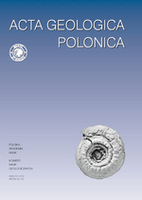
ACTA GEOLOGICA POLONICA
Connecting researchers to the forefront of geological research.ACTA GEOLOGICA POLONICA is a distinguished journal published by the Polska Akademia Nauk, in collaboration with the University of Warsaw's Geology Department. Since its inception, it has served as a vital platform for disseminating innovative research in the field of Geology, reflecting a commitment to advancing scientific knowledge in Earth and planetary sciences. With an ISSN of 0001-5709 and an E-ISSN of 2300-1887, this journal provides a rigorous review process and is classified in the Q3 quartile for Geology as of 2023, indicating its growing influence in the discipline. Despite not being open access, the journal facilitates meaningful contributions that span a range of geological topics from fundamental research to applied sciences, thereby enriching the academic landscape. Researchers, professionals, and students alike are encouraged to engage with the valuable findings and discussions contained within its pages, which continue to shape the future of geological inquiry.

GEOSCIENCES JOURNAL
Innovating Solutions for a Sustainable Future.Welcome to the GEOSCIENCES JOURNAL, a pivotal publication in the fields of Earth and Planetary Sciences and Environmental Science, proudly presented by the Geological Society of Korea. Established in 1997, this journal has become a prominent platform for researchers, professionals, and students, offering a rich collection of peer-reviewed articles that explore a diverse array of geoscientific topics. With an impressive Q2 ranking in both Earth and Planetary Sciences and Environmental Science categories for 2023, it stands as an essential resource in the academic community. Though it operates under a traditional subscription model, GEOSCIENCES JOURNAL remains dedicated to advancing knowledge through rigorous research. Addressed from its headquarters in Seoul, South Korea, the journal aims to foster a deeper understanding of geosciences, encouraging innovation and collaboration in tackling today’s environmental challenges.
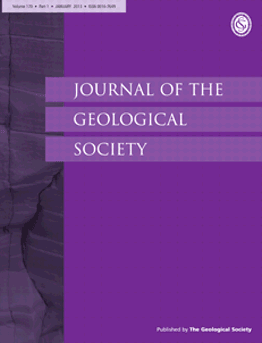
JOURNAL OF THE GEOLOGICAL SOCIETY
Pioneering Insights in Earth and Planetary SciencesJOURNAL OF THE GEOLOGICAL SOCIETY, published by GEOLOGICAL SOC PUBL HOUSE, is a premier academic journal dedicated to advancing the field of geology. With a rich history dating back to 1845 and continuously published until 2024, this journal caters to a diverse audience of researchers, professionals, and students involved in earth sciences. The journal is recognized for its high impact factor, situating it in the top Q1 category in the field of geology, as indicated by its impressive Scopus rank of #49 out of 321, positioning it at the 84th percentile in Earth and Planetary Sciences. This esteemed scholarly platform promotes rigorous peer-reviewed research, ensuring that novel findings contribute to the global geological discourse. Although it operates under a subscription model, the journal's archive offers valuable insights for anyone pursuing excellence in geological research. The JOURNAL OF THE GEOLOGICAL SOCIETY stands as a vital resource for disseminating scientific knowledge and fostering educational growth within the field.